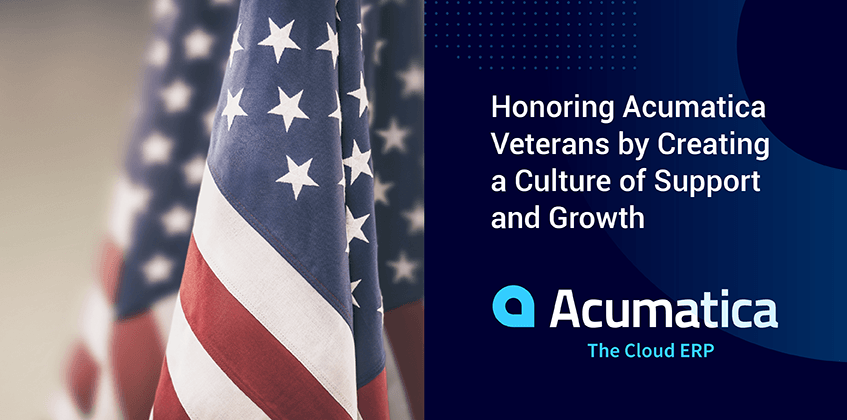
November 11 is the day in the United States when we honor veterans and their sacrificial service for our country. We’ve been doing this every year since 1938– first as Armistice Day and then as Veterans Day in 1954 — celebrating American veterans of all wars).
For me, this day holds special meaning. I am a proud veteran of the U.S. Army, my husband is a veteran, and I work alongside several Acumatica employees who also served their country in the military. So, today, I’m excited to have the opportunity to share a little bit about my military experience, highlighting how it’s impacted my life and career choices and shining a light on the amazing support Acumatica provides—not only to us veterans but to all members of the Acumatica Community.
Choosing the Military
Growing up, my dad—who was originally from England—was, as I describe it, “pro-military.” He was always encouraging me to investigate the military as a career option, and because it was something that interested me, I did.
I enlisted in the Army after high school and applied for an ROTC (or Reserve Officers’ Training Corps) scholarship. ROTC is a top leadership program that pays your college tuition and is part of your college curriculum, which also includes leadership, development, military skills, and career training. When you graduate, you’re a second lieutenant in the Army, Army Reserve, or Army National Guard.
I understood that ROTC would be life-changing but not how much. I initially thought it would be a fantastic college experience, but as I learned how to become a decisive leader, how to motivate others, and how to be empowered, I realized that ROTC would impact my whole life.
Life in the Military
My first duty assignment was as a lieutenant at Fort Campbell, Kentucky where I underwent Air Assault training. Air Assault’s official purpose is “to train Soldiers in Air Assault operations, sling-load operations, and rappelling. Upon graduation of the course, each soldier can perform skills required to make maximum use of helicopter assets in training and in combat to support their unit operations.”
It was a demanding ten-day course as well as a great introduction to my time at Fort Campbell. When my assignment neared its completion, I contemplated getting out, but I realized that I had a new goal: to be a Company Commander.
Like any leadership position, a Company Commander engenders a greater level of responsibility and requires more training. Once I completed the additional coursework and training (including airborne school), I was stationed at Fort Bragg, North Carolina where I soon took command of a 15-person movement control team. With only a short amount of time to get to know the team, we headed to Mosul Airbase in Iraq, in support of Operation Iraqi Freedom.
I won’t go into the details, but my year-and-a-half deployment had me taking on many challenging tasks, which required stepping outside of my comfort zone. I was also learning how to collaborate with various elements within the Army and the Air Force. During that time, my confidence in my leadership abilities grew, and after heading home after the deployment, I took another tour—this time as a transportation officer, which put me in charge of approximately 148 people and about $2 million in equipment.
I was stationed outside Baghdad for a little over a year, and needless to say, I was really happy we brought everybody home despite some very tough circumstances.
Life After the Military
After returning from Baghdad, I was promoted to Major, but I was ready to take on a new challenge. And it was much more difficult than I realized.
The challenge? Motherhood.
To all the mothers out there, I understand how hard being a mother is—even more so when I wasn’t sure how to transfer my skills into a “real-world” career. Eventually, I ended up in sales where I quickly found that my problem-solving, people, and communication skills held me in good stead.
Fast forward to today, and I’m the blessed mother of three (and serving on the board of our local school) and am an Acumatica Major Channel Partner Account Manager. I attribute much of my success to my time in the military, which helped me become a confident leader who could empathize with others wherever they are in life.
The military also helped me recognize the importance of getting comfortable with being uncomfortable. What do I mean by that? My dad passed away while I was deployed, and I was heartbroken, but part of me felt that I couldn’t show my pain in front of my soldiers. Thankfully, I listened to the other part of me that said it was important for them to see me not only as a leader, but as a friend, a mother, and a daughter who lost her father.
My team came together, rooting for me and giving me the peace of mind to go home and grieve. It showed me that I could be myself and not somebody else, that I could encourage my team by being an example of a strong, caring woman who knows anything is possible if you remain true to yourself.
Acumatica and Military Veterans
In my seven years at Acumatica, I have been immersed in a culture that welcomes everyone. Through the AcumatiCares program, Acumatica’s passionate commitment to reducing our environmental impact and fostering sustainable business practices—such as inclusion, diversity, and gender equality—comes to life.
Acumatica’s celebration, inspiration, and uniting of people is evident to every person who walks through the door, including my fellow Army veteran and Acumatica co-worker, Scott Sandusky, Presales Engineer.
Scott served in the United States Old Guard—which is George Washington’s original militia—as an E-4/CPL – Escort to the President of the United States of America. Scott’s time in the military offered him more than a few benefits, some of which he’s been able to utilize in his position at Acumatica. “Beyond simply getting the GI Bill to help offset the costs of college I have often said that the most important thing I have learned from my time in the Army was time management. Most people don’t understand how long a minute, or an hour, or a day is. That’s a lot of time, and, when used wisely you can accomplish a lot.”
In addition to understanding efficiency, Scott says any workplace would benefit from a veteran’s can-do attitude. “Show me a veteran, and I’ll show you someone who is ready for anything.”
This sentiment is echoed by another Acumatica veteran, Eric Moreau, who was a Specialist in the Signal Corp. “Whether at Acumatica or any organization when hiring a veteran, you can rest assured that they are going to be dedicated to the mission and carry with them leadership traits. These are two characteristics that will allow a veteran to excel in any role for which they qualify.”
And Acumatica veteran Donna Tapella, a former sergeant in the US Army, adds: “One of the most important things in the military is loyalty to your team and working as a team. In the corporate world, teamwork, trust, and loyalty to other team members are just as important.”
Efficiency, dedication, teamwork, and loyalty are marketable skills for any career, including those in the technology industry. Like the military itself, technology is constantly growing and evolving, and veterans understand how to be flexible, how to collaborate, and how to be leaders within such a fluid environment.
All of these are skills Acumatica desires in our Acumatica community team members. That’s why Acumatica is dedicated to hiring talented veterans, and one way we’re working to attract veterans is by posting inclusive job descriptions in several military-specific groups, such as Military Officers Association of America (MOAA) Career Networking, Ex-Military Jobs Networking Group, and Military Spouses Seeking Careers.
Creating a diverse, inclusive, and supportive community that builds the future of business, together, is our rallying cry, and according to CEO John Case, we’re succeeding. “Every company says they have a great community. Every company says, ‘Ours is different. Our ecosystem is thriving.’ And some of those stories stretch the truth. But, at Acumatica, that story is so real.”
Celebrating Military Veterans
As a veteran myself, I want to thank my fellow veterans for their voluntary, honorable, and sacrificial service. It’s a challenging endeavor fulfilled by a diverse audience made up of different ages, ethnicities, and backgrounds.
At Acumatica, we’ve created—and are continually cultivating—an inclusive and diverse community that supports our veterans with intentionality. I’m excited to share that Acumatica is considering several new initiatives, including a support program that has our current veteran employees train hiring managers to better understand how a veteran’s experience can translate into a civilian role and running veteran recruiting events.
Again, I want to express my heartfelt appreciation to all those who have served or are serving today. And if you’re looking to utilize your skills in a welcoming, encouraging, and safe environment, I hope you’ll consider Acumatica. Helping customers, partners, creators, and employees within the Acumatica Community thrive as individuals as well as a team is at the heart of everything we do.
If you have any questions about joining the team at Acumatica, contact our team today.
 Canada (English)
Canada (English)
 Columbia
Columbia
 Caribbean and Puerto Rico
Caribbean and Puerto Rico
 Ecuador
Ecuador
 India
India
 Indonesia
Indonesia
 Ireland
Ireland
 Malasya
Malasya
 Mexico
Mexico
 Panama
Panama
 Peru
Peru
 Philippines
Philippines
 Singapore
Singapore
 South Africa
South Africa
 Sri-Lanka
Sri-Lanka
 Thailand
Thailand
 United Kingdom
United Kingdom
 United States
United States






